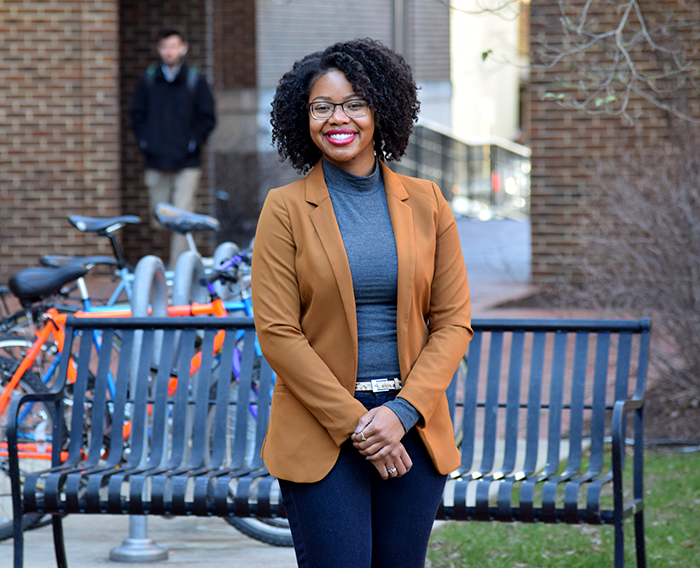Kendra Cabler: Advocating for those with the greatest need

Kendra Cabler expects to earn her Ph.D. in Education with a concentration in urban services leadership from the VCU School of Education this May. She’s a member of the Kappa Delta Pi International Honor Society in Education and an AACTE Holmes Scholar. She currently works at the VCU da Vinci Center for Innovation as assistant director of access, inclusion and community.
What drew you to the field of education?
I started out as a business major as an undergraduate at The College of William and Mary. Since it’s a liberal arts school, we were required to take lots of other classes. I took Sociology 101, where I learned about social constructs and how we engage and interact with the world around us.
I had already experienced some culture shock relocating to Williamsburg compared to my hometown of Virginia Beach – a military town – especially in terms of who I saw around me. I was grappling with all of this as I sat in Sociology 101 and thought, “This program fits me.”
I changed my major to sociology and began thinking more seriously about who and what I wanted to be. I talked with faculty and administrators about their career paths – not just what got them where they were, but why they chose that particular path, and what it meant to have their specific degree.
That entire experience and the perspective I got from mentors, helped me realize that higher education was the field I wanted to be in.
Who inspired you to pursue a doctoral degree?
My mom. She completed her doctoral degree about three years ago, at age 58. It was inspiring to see her succeed and achieve her goal. She was able to pursue and complete her doctorate in the midst of a successful and well-established career. Still, it reminded me that I already knew where my passions were, and the goal of obtaining my Ph.D. was already on my mind. I didn’t necessarily have to wait until I had a career under my belt to pursue my degree.
For me, earning a Ph.D. is in part a reflection of the work completed by those that have come before me. An acknowledgement of the fact that I would not have been permitted to achieve this level of formal education even decades ago. As a result, my position comes with an expectation that I continue to pay it forward, to lift while I climb and advocate for access and equity in the field of education.
"[S]ince VCU is an urban university, the School of Education was the perfect transition."
When you decided to pursue your doctoral degree, what made you choose VCU SOE?
I wanted a different institutional experience than I had at William and Mary. I knew my professional experiences prior to pursuing this degree were centered on more rural/suburban institutions, and since VCU is an urban university, the School of Education was the perfect transition.
I was vice president of programs for the Virginia Center for Inclusive Communities when I made the decision. I traveled a lot, but that travel wasn’t conducive to completing a doctoral program. I left that job, which I loved, to begin pursuing my Ph.D. I worked as an advisor and instructor at VCU for almost two years before becoming a senior advisor in the L. Douglas Wilder School of Government & Public Policy. I transitioned into my role at the da Vinci Center at the start of the 2018-2019 academic year.
There’s a lot to be said about pursuing an advanced degree at a university where you’re employed. Besides the tuition benefit, it’s a really unique opportunity to walk out of class each day with something you’ve learned, and apply it the very next day to your job at the same university.
Any highlights from your recent semester?
The biggest highlight was passing my prospectus hearing!
Beyond that milestone, I have been most grateful for the support I’ve received throughout the entire program and process. My supervisors have been encouraging and supportive, and my program advisor, Dr. Robin Hurst, and dissertation chair, Dr. Rosalyn Hobson-Hargraves, have worked together beautifully on my behalf to provide a good balance of support along with knowing when to push me.
I also have to mention Dr. Michael Broda. I come from a social science background, and coming into a research-based program was a bit daunting at first. My first statistics class was with Dr. Broda, and I was terrified. Thankfully, he explained things in a way that was relatable and easy to absorb. I’ve talked with other classmates about the experience, and we all appreciate how much he helped us get out of our own heads, grasp the material, and tell ourselves that we can do this.
What do you want to do with your doctoral degree?
It’s most important to me that I’m somewhere where I feel like I’m making a difference, where I have an opportunity to advocate for people who have not traditionally had a seat at the table.